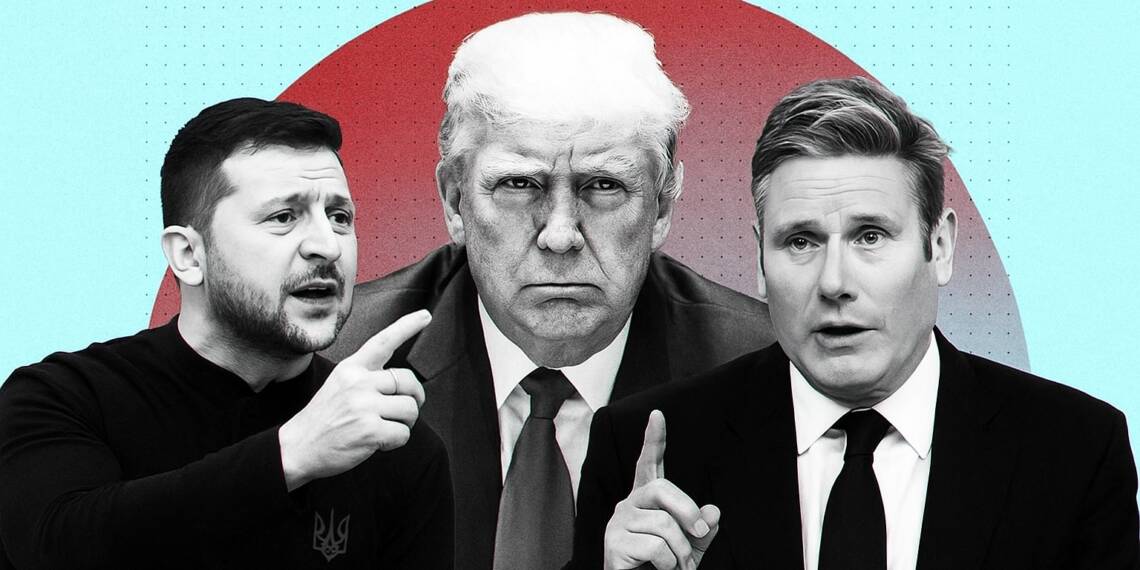In a significant escalation of collective support for Ukraine, the British government has spearheaded a new 50-day initiative designed to enhance Kyiv’s defensive capabilities and force Russia’s Vladimir Putin to the negotiating table.
The campaign, announced by UK Defence Secretary John Healey during the most recent summit of the Ukraine Defence Contact Group (UDCG), is a direct response to mounting Russian attacks and a dramatic ultimatum issued by U.S. President Donald Trump: Russia now has 50 days to reach a peace deal with Ukraine or face crippling Western sanctions.
The 50-Day Drive
Healey addressed the 52-nation UDCG coalition, framing the current situation as a moment of “maximum opportunity” for Kyiv’s backers. “As members of this UDCG, we need to step up, in turn, a 50-day drive to arm Ukraine on the battlefield and to help push Putin to the negotiating table,” Healey stated, underscoring the synchronization of military action with diplomatic goals.
This push coincides with a pattern of intensified Russian aerial assaults and ground operations, which have prompted increasing urgency among Western nations to provide effective military assistance.
Trump, whose new administration is keen on shifting the diplomatic landscape, has committed to supplying Ukraine with advanced military hardware and made clear that failure on Russia’s part to seek peace within the deadline will result in punishing tariffs and further isolation.
The UK and Germany Step Forward
Britain has emerged as a pivotal player in this 50-day campaign, reinforcing its status as one of Ukraine’s most committed allies. In just the past two months, the UK has delivered £150 million (approx. $202 million) worth of air defence missiles and artillery rounds.This is part of a larger UK pledge to spend £700 million in 2025 on bolstering Ukraine’s air defence and artillery ammunition stockpiles.
Drones have become an indispensable component of modern warfare in Ukraine, and the UK has supplied some 50,000 drones over the last six months. An additional 20,000 unmanned aerial vehicles will come from a coalition led by Britain and Latvia, reflecting the Western focus on technological supremacy in the ongoing conflict.
Healey, co-chairing the UDCG with German Defence Minister Boris Pistorius, revealed an expanded Anglo-German partnership to provide Ukraine with 220,000 rounds of 35mm ammunition for anti-aircraft guns, funded in part by a €170 million package from Berlin. Germany is also readying the delivery of five Patriot missile batteries—critical to defending Ukrainian cities from escalating Russian air raids.
Multifaceted Support: Air Defense, Artillery, and Drones
Britain’s combination of direct aid, technology transfer, and coalition-building has positioned it at the forefront of allied support, even as previous U.S. policy shifts have caused some uncertainty about long-term American commitments to European security.
In recent months, the UK and Germany have sharply increased their military contributions to support Ukraine’s defense against Russia. The UK has provided £150 million worth of air defence missiles and artillery rounds over the last two months, demonstrating a rapid and substantial response to the ongoing conflict. Additionally, Britain has pledged a total of £700 million for air defence systems and artillery ammunition for the year 2025, indicating a long-term commitment.
Drone warfare has also emerged as a critical component, with the UK delivering 50,000 drones in the past six months. This capability will be further augmented by an additional 20,000 drones being supplied through a coalition effort led by the UK and Latvia.
Meanwhile, a significant Anglo-German partnership has resulted in the provision of 220,000 rounds of 35mm anti-aircraft ammunition for Ukraine’s defenses, financed in part by €170 million from Germany. Moreover, Germany is contributing five Patriot missile batteries, which are earmarked for deployment to major Ukrainian cities most vulnerable to Russian aerial attacks.
These combined efforts reflect the scale, urgency, and multinational nature of the Western response—underscoring an evolving strategy to reinforce Ukraine both immediately and in the long term.
Political Ramifications
This 50-day drive is about more than firepower—it is a strategic gamble to break a military and diplomatic deadlock. Healey declared, “We will play our full part in its success,” signaling Britain’s determination to maintain momentum and keep Western partners engaged at a critical time.
Shadow Defence Secretary James Cartlidge publicly endorsed the initiative, emphasizing: “Standing firm alongside the U.S. and supporting their 50-day deadline ensures Putin faces maximum pressure to pursue peace,” and critiqued any wavering by allies as a risk to both Ukraine and European stability.
The Present and the Path Ahead
As Russia intensifies attacks on Ukrainian cities, control of the air and continued flow of ammunition are priorities for Kyiv’s survival on the battlefield. The 50-day window, aligned with Trump’s deadline for Russian compliance or sanctions, serves as both an operational and symbolic rallying point—delivering not only material aid but also a united front calibrated to maximize pressure on Moscow.
The Ukraine Defence Contact Group, now led by European powers, is seizing the initiative in the broader diplomatic confrontation. With fighting showing no sign of abating, the West’s capacity to translate enhanced military backing into a sustainable peace remains the foremost challenge.







